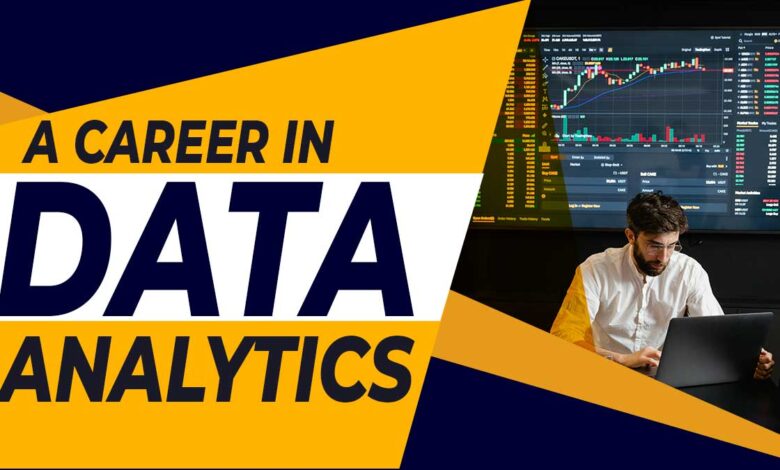A career in Data Analytics | Data Analyst: Career Path and Qualifications

The process of examining data sets to draw conclusions based on the information contained within them using various software or specialized systems is commonly defined as data analytics. In recent years, data analytics has grown in importance in commercial industries, allowing for more informed business decisions based on scientific data and research. The minimum eligibility criteria for a career in Data Analytics is Bachelor’s degree with at least 50% marks in aggregate or equivalent preferably in Science or Computer Science from a recognized university.
Table of Contents
Required Skillset for a career in Data Analytics:
Strong analytical and numerical skills, as well as a thorough understanding of computer software(s) such as Querying Language (SQL, Hive, Pig), scripting Language (Python, Matlab), Statistical Language (R, SAS, SPSS), and Excel, are required to be proficient in data analysis.
Good interpretive and communication skills are required to be a successful data analyst, i.e., the ability to explain the process of data analysis and its outcome to a diverse audience (technical and non-technical). He or she must also be detail-oriented and have problem-solving capabilities.
Some of the online data analytics courses to start a career in data analytics are given in the table below:
| Certificate Name | Duration | Fee |
| PG Certification in Data Science | 7 months | Rs 3,736 per month |
| Business Analytics Course by EduPristine | 10 weekends | Rs 25,000 onwards |
| Data Analytics Master Certificate by SimpliLearn | 1 year | Rs 44,999 |
The following topics are covered in a Data Analytics Course:
| Retail Analytics | Customer Analytics | Supply Chain Analytics |
| Marketing Analytics | Pricing Analytics | Social Network Analysis |
| Simulation | Machine Learning | Optimization |
| Data Visualization | Statistical Analysis | Forecasting Analytics |
| Business Fundamentals | Text Analytics | Data Collection |
| Data Structures and Algorithms | Probability and Statistics | Relational Database Management Systems |
Some of the software tools taught in the Data Analytics course are given below:
| Stata | NodeXL- MeXL |
| Python | XLMiner |
| Hadoop (AWS) | Tableau |
| MySQL | Simio |
| R | @Risk |
Some of the colleges offering courses in Data Analytics are as follows:
- 1. Institute of Management Studies, Ghaziabad
- 2. Prestige Institute of Management and Research located in Indore
- 3. Chitkara University, Himachal Pradesh
- 4. Vellore Institute of Technology, Vellore
Some of the top companies where we can work after doing a course in data analytics are as follows:
- 1. Mu Sigma Analytics
- 2. Accenture Analytics
- 3. Fractal Analytics
- 4. SIBIA Analytics
Some of the top Data Analytics job profiles are as follows:
1. Data Analyst:
A data analyst gathers and stores information about sales figures, market research, logistics, linguistics, and other behaviors.
Requirements for a Data Analyst:
- 1. The candidate should have a bachelor’s degree in computer science from an accredited university or college.
- 2. Previous work as a data analyst or in a related field.
- 3. The ability to work collaboratively with stakeholders to assess potential risks.
- 4. The ability to communicate business requirements in non-technical, lay terms.
Responsibilities of a Data Analyst:
- 1. Management of master data, including creation, updates, and deletion.
- 2. User and role management
- 3. Ensure the quality of imported data, working with quality assurance analysts as needed.
- 4. Data set commissioning and decommissioning 5. When processing confidential data and information, adhere to the guidelines.
2. Healthcare Data Analyst:
Healthcare data analysts manage and analyze hospital data. They are in charge of gathering and organizing healthcare data, analyzing data to help provide optimal healthcare management, and communicating their findings to management.
Requirements for a Healthcare Data Analyst:
- 1. A bachelor’s degree in mathematics, statistics, healthcare administration, or a closely related field is required.
- 2. A master’s degree is preferred.
- 3. At least four years of experience in an analytical role.
- 4. Knowledge of database programming languages such as SQL.
- 5. Data manipulation proficiency in Python.
Responsibilities of a Healthcare Data Analyst:
- 1. Gathering and organizing medical data.
- 2. Data analysis to aid in the delivery of optimal healthcare management and decision-making.
- 3. Using healthcare data to meet administrative needs and objectives.
- 4. Recognize data storage and sharing methods.
- 5. Analyzing data to discover patterns and trends.
3. Financial Analyst:
Financial analysts investigate the performance of investments such as stocks, bonds, commodities, and others in order to advise businesses and individuals making investment decisions.
Financial Analyst Qualifications:
- 1. A bachelor’s degree in business, accounting, finance, economics, or a closely related field is required.
- 2. Proven financial industry experience.
- 3. Working knowledge of spreadsheets, databases, and financial software applications.
- 4. Excellent presentation, reporting, and communication abilities.
- 5. Demonstrated understanding of financial forecasting and diagnosis, corporate finance, and data analysis.
Responsibilities of a Financial Analyst:
- 1. Financial data analysis
- 2. Conducting research on macroeconomic and microeconomic conditions.
- 3. Based on the analysis, prepare accounting and other required reports and projections.
- 4. Capital expenditure and asset depreciation evaluation
- 5. Creating and assessing records, statements, and profit forecasts.
4. Systems Analyst:
Systems analysts evaluate the effectiveness and efficiency of an organization’s information technology systems and devise plans to address any shortcomings.
System Analyst Qualifications:
- 1. A bachelor’s degree in computer science, information systems, or a closely related field is required.
- 2. Prior experience as a systems analyst or in a related role.
- 3. Business-related qualifications are preferred.
- 4. Excellent analytical and problem-solving abilities.
- 5. Outstanding communication abilities.
- 6. The ability to work well in a group.
Responsibilities of a Systems Analyst:
- 1. Assessing current IT systems, such as hardware, software, and network capabilities.
- 2. Discuss system requirements with management and employees.
- 3. Developing new systems to address any shortcomings in existing systems.
- 4. Creating cost-benefit analyses for all proposed improvements.
- 5. Working with the IT team to put your plan into action.
- 6. Validating that the new systems are working as expected.
The table given below summarizes the aforementioned job profiles as well as their annual salaries in India:
| Job Profile | Average Salary Per Annum |
| Data Analyst | ₹6,00,000 |
| Healthcare Data Analyst | ₹7,65,536 |
| Financial Analyst | ₹5,00,000 |
| Systems Analyst | ₹9,00,000 |
The table given below summarizes the above job profiles and their annual salaries per annum in the other four countries:
| Country | Data Analyst average annual salary | Healthcare Data Analyst average annual salary | Financial Analyst average annual salary | Systems Analyst average annual salary |
| United Kingdom | £28236 | £29661 | £34017 | £37,326 |
| United States | $69,517 | $69767 | $73,725 | $77,245 |
| Canada | $60,273 | $62,595 | $67,631 | $69,743 |
| Switzerland | CHF 96,121 | CHF 121,000 | CHF 160,000 | CHF 122,000 |
Conclusion
In the above articles, we have learned in detail about a career in data analytics. We have also learned about top data analytics job profiles and their average salaries per annum in India and the other four countries. The data analytics industry in India is expected to play a critical role in the industry’s future, as well as create significant job opportunities and improve lifestyles. This industry will be disruptive in the future, resulting in a paradigm shift.
FAQs regarding a career in Data Analytics:
-
Are Data Analytics and Data Science courses the same? What exactly is the distinction between Data Analytics and Data Science?
They absolutely are not. Data science teaches you how to forecast future risks and opportunities using historical data. Data analytics courses, on the other hand, teach you to draw conclusions based on the data provided.
-
What are the prerequisites for Data Analytics courses?
It depends on the level of degree you choose. A Class 12 certificate is the minimum requirement for any data analytics course.
-
What is the significance of Data Analytics courses?
In many ways, data analytics is critical for a business. Data Analytics courses are a win-win situation for business optimization, research-based decision-making, and risk management.
-
What Data Analytics tools should you be familiar with while taking data analytics courses?
Tableau, Microsoft Excel, SQL, Python, R, and other data analytics tools are available.
-
What are the best courses in data analytics?
The top data analytics courses are Coursera’s Data Science Specialization, Meti’s Introduction to Data Science, Coursera’s Applied Data Science with Python Specialization, and edX’s Data Science MicroMasters.




